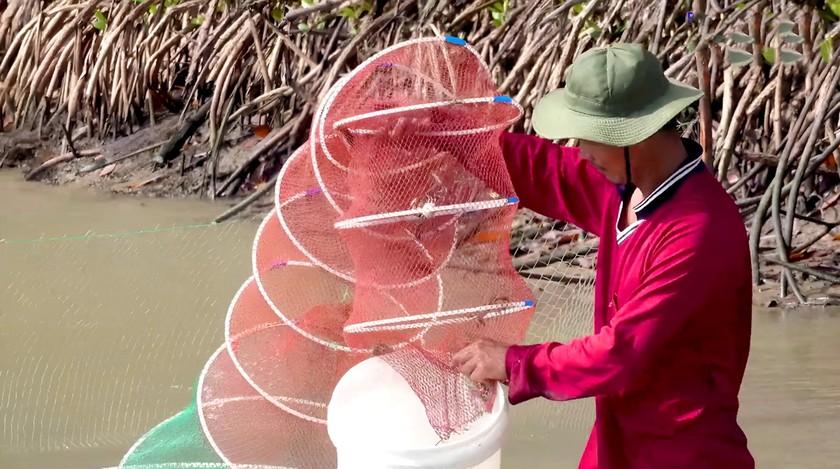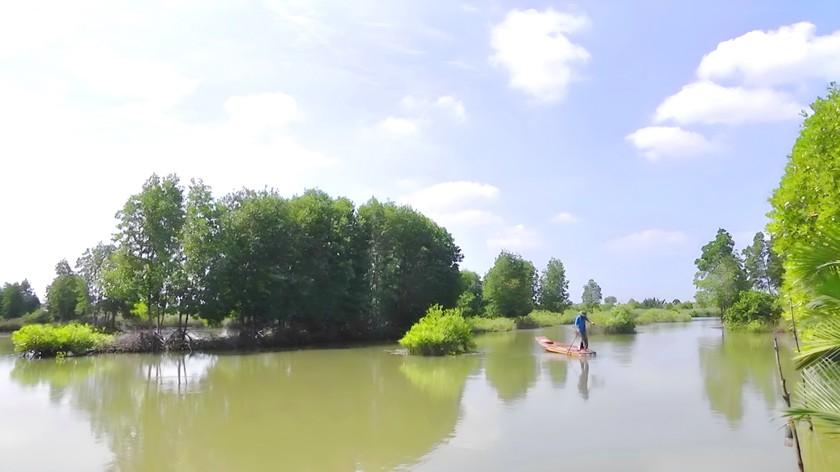(seafood.vasep.com.vn) To maximize natural advantages and increase the value of local aquatic products, Ca Mau province is promoting the ecological shrimp farming model under mangrove forests. This model not only brings high profits to people thanks to businesses committing to purchasing products at prices 10-20% higher than the market price but also aims for sustainable development and environmental friendliness.
Adapting to climate change, bringing economic efficiency
Ca Mau is the southernmost province of Vietnam, being bordered by the sea on three sides. The black tiger shrimp farming industry has been formed and developed for many years, identified as the economic strength of the province with an aquaculture area of about 303,000 hectares, of which the shrimp farming area is about 280,000 hectares. Shrimp farming is currently the main livelihood of the people in the province, with shrimp production increasing by an average of 6-8% annually. In 2023 only, the province's shrimp production reached nearly 230,000 tons.
 Developing the ecological shrimp farming model under mangrove forests in Ca Mau aims to leverage the local area's inherent potential and advantages to increase the added value of aquatic products.
Developing the ecological shrimp farming model under mangrove forests in Ca Mau aims to leverage the local area's inherent potential and advantages to increase the added value of aquatic products.
The ecological shrimp farming model in Ca Mau serves two objectives: economic development and environmental protection, aiming for sustainable aquaculture that can adapt to climate change. In recent years, the province has focused on developing this model to effectively exploit the local area's potential and increase the value of aquatic products. This is considered a sustainable model and has been highly praised by scientists.
In addition, Ca Mau province has received much support from international projects in aquaculture. The head of the Ca Mau Fisheries Sub-department stated that the benefit of the ecological shrimp farming model in Ca Mau is bringing high profits to people as businesses processing the products commit to purchasing them at prices 10-20% higher than the market price
Moreover, ecological shrimp farming offers many benefits such as: improving farmers' shrimp farming skills, raising awareness about forest protection as their responsibility, and enabling them to directly negotiate prices with businesses. Furthermore, thanks to eco-certified shrimp, farmers receive support for forest care services; authorities can effectively manage farming areas, saving management costs; and businesses obtain international certifications, enhancing the reputation of clean shrimp products on the market.
Therefore, the ecological and organic shrimp farming model is highly suitable for responding to climate change. This natural farming model provides high-quality, food-safe shrimp products, meeting both domestic and export demands.
Enhancing solutions for developing mangrove shrimp farming.
 Organic, ecological mangrove shrimp farming offers a sustainable solution to climate change.
Organic, ecological mangrove shrimp farming offers a sustainable solution to climate change.
To promote sustainable ecological shrimp farming in mangrove forests, Ca Mau province aims to convert nearly 30,000 hectares of integrated shrimp-forest farming to ecological shrimp farming under mangrove canopies by 2030. Moreover, the province plans to certify over 25,000 hectares of these farms. The People's Committee of Ca Mau province has directed relevant agencies to seek technical solutions to increase productivity in this ecological shrimp farming model. Simultaneously, the province will expedite the development of production chains linked with export enterprises to assist farmers in selling their products at higher prices. Farmers will receive technical guidance on forest planting and shrimp farming, as well as support for quality shrimp seed to expand organic shrimp-forest areas, producing clean products that command premium prices.
The Department of Agriculture and Rural Development of Ca Mau province stated, "The ecological shrimp farmed in mangrove forests of Ca Mau has gained favor in the international market. Currently, the Department is determined to direct specialized units to expand the area of ecological shrimp farming under mangrove canopies to 30,000 hectares and certify over 25,000 hectares by 2025. Concurrently, we aim to expand 4,000-5,000 hectares of shrimp-forest farming to organic standards, strengthen farmer training on environmental protection, support forest planting to ensure adequate areas, and develop irrigation systems and infrastructure to meet the requirements of shrimp farming zones, thereby ensuring compliance with the standards set by our partners for the province's ecological shrimp."
In Ca Mau province's Agricultural Restructuring Project, ecological shrimp farming has been prioritized as one of the key sectors for development. The province has also focused on building a value chain for ecological shrimp farmed in mangrove forests.
Currently, Ca Mau province has approximately 80,000 hectares of mangrove forests, of which 30,000 hectares are used for shrimp farming under the mangrove canopy. More than 20,000 hectares of these have achieved international certifications such as Naturland, EU Organic, Selva Shrimp, ASC, and BAP, with an average yield of 250-300 kg/ha/year. Notably, Ngoc Hien district has 14,010.49 hectares of shrimp farms that were newly certified in 2023 according to organic, Naturland, Selva Shrimp, and EU standards.
In the mangrove shrimp farming areas, businesses such as Minh Phu, Camimex, and Nam Can Import-Export Company have signed cooperation agreements to operate on areas managed by the Nam Can Forest Protection Management Board (Nam Can district), Dat Mui (Ngoc Hien district), Kien Vang (Ngoc Hien district), and Ngoc Hien Forestry Company, with a total area of 14,010.49 hectares involving 1,886 households.
To date, Ngoc Hien and Nam Can districts have been developing value chain linkage models, yielding high economic efficiency. Among these, the mangrove shrimp farming model has attracted the participation of many companies and factories, contributing to the development of raw material zones and supporting certification costs. As a result, the output is guaranteed, and shrimp prices are consistently higher than market prices.
Additionally, farmers receive support for reforestation costs and participate in training sessions to enhance their knowledge of responsible production, contributing to the sustainable development of the shrimp industry in Ca Mau.